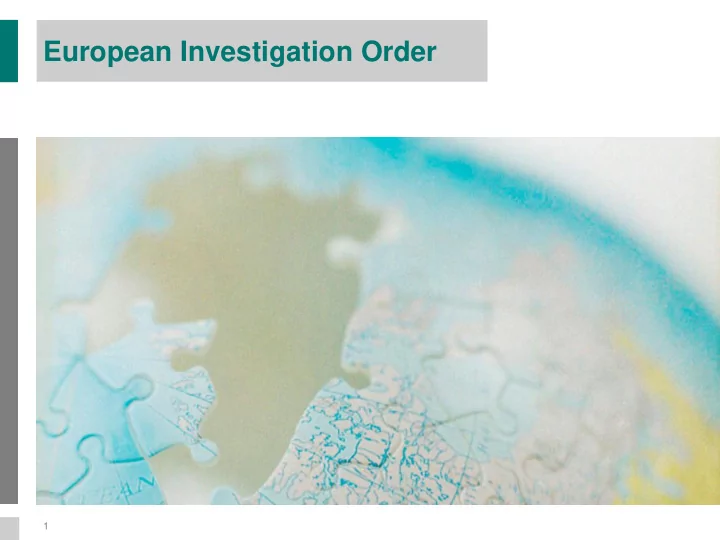

European Investigation Order 1
Plan I. Background II. Types of Cooperation A. Mutual Legal Assistance B. Mutual Recognition III. European Investigation Order A. Comparison with EEW B. Implementation C. Double Criminality D. Procedural Rights IV. Lessons learned from EAW
Background • Wish to speed up slow MLA • 2003-2008: MS lack of trust difficulties with MR and EEW • 2009: Group of 7 MS present proposal for EIO • Idea: – Replace traditional MLA almost fully – Based on MR principle – Using similar wording as EEW – But much wider in scope 3
Plan I. Background II. Types of Cooperation A. Mutual Legal Assistance B. Mutual Recognition III. European Investigation Order A. Comparison with EEW B. Implementation C. Double Criminality D. Procedural Rights IV. Lessons learned from EAW
Types of Cooperation MLA MR When? Diplomatic cooperation Introduced in 2000 Where? Worldwide EU Requesting state Issuing state Requested state Who? Executing state Request What? Order or warrant How? Many possibilities Limited possibilities Follow up? Dependent on In principle grounds for refusal blind execution 5
Types of Cooperation MLA MR Locus regit actum: requested state Decision executed as vs domestic decision Applicable Forum regit actum: requesting state law? Admissibility of evidence Dependent on In principle Follow up? grounds for refusal blind execution • • CoE Convention + Protocols FD on EAW • • EU Convention + Protocol FD on Freezing Order • • Prüm FD on EEW Instruments? • • Schengen Implementation Directive on EIO • Convention ... • … 6
Plan I. Background II. Types of Cooperation A. Mutual Legal Assistance B. Mutual Recognition III. European Investigation Order A. Comparison with EEW B. Implementation C. Double Criminality D. Procedural Rights IV. Lessons learned from EAW
Comparison with EEW EEW EIO When? 2008 2014 (impl. by 19.01.2011) (impl. by 22.05.2017) Where? All EU MS Not Denmark and Ireland What? Existing evidence Existing (so MLA still needed) and new evidence How? Transfer of existing objects, Any investigative measure documents or data exc. JITs Timing? 30 + 60 days (after receipt!) 30 + 90 days (after decision!) 8
Comparison with EEW EEW EIO Judicial authority Judicial authority to to Who? Authority Judicial authority competent under national law (+ validation procedure) Follow up? Limited grounds for refusal Limited grounds for refusal Applicable Executing state Executing state law? 9
Plan I. Background II. Types of Cooperation A. Mutual Legal Assistance B. Mutual Recognition III. European Investigation Order A. Comparison with EEW B. Implementation C. Double Criminality D. Procedural Rights IV. Lessons learned from EAW
EIO - Implementation • Implementation status • Handbook? • Flexible provisions • Grounds for refusal 11
Plan I. Background II. Types of Cooperation A. Mutual Legal Assistance B. Mutual Recognition III. European Investigation Order A. Comparison with EEW B. Implementation C. Double Criminality D. Procedural Rights IV. Lessons learned from EAW
EIO - Double Criminality EEW EIO Only for: No check • coercive measures Double criminality? Except when: • offence is in 32-list and but ground for refusal based on • max. prison sentence of min. territoriality 3yrs 13
Plan I. Background II. Types of Cooperation A. Mutual Legal Assistance B. Mutual Recognition III. European Investigation Order A. Comparison with EEW B. Implementation C. Double Criminality D. Procedural Rights IV. Lessons learned from EAW
EIO – Procedural Rights • Remedies • Defendant • Right to information 15
Plan I. Background II. Types of Cooperation A. Mutual Legal Assistance B. Mutual Recognition III. European Investigation Order A. Comparison with EEW B. Implementation C. Double Criminality D. Procedural Rights IV. Lessons learned from EAW
Lessons Learned from EAW • „Blind“ recognition • Proportionality • Fundamental rights 17
Conclusion • Implementation • Practical issues • Trust 18
Thank you for your attention and cooperation! Dr. Els De Busser Senior Lecture – Senior Researcher Faculty of Law Faculty of IT & Design, Centre of Expertise Cyber Security The Hague University of Applied Sciences 19
Recommend
More recommend